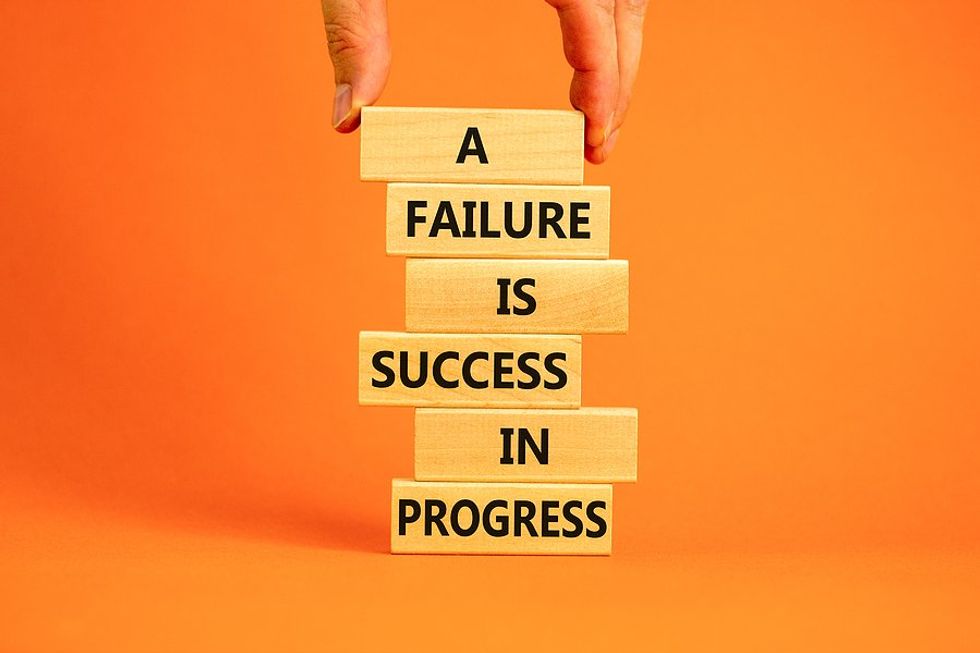
Although we shoot for perfection and success at work, we all experience failure at some point in our careers. Failure can be difficult to handle in a professional setting. Executives and other leaders in the workplace—our mentors, the ones we look up to at work—have all failed. Not only that, but they've recovered from failure and found success in the process.
We recently asked our successful executives how they recover from a failure at work.
Here are their responses...
Lisa Perry, Global Marketing Executive
When I worked at The Disney Channel, one of my jobs was to proof ads. I was the last sign-off before the ad went to press. It was an exciting time as we launched a new campaign in support of a new series. It was quickly dampened when I learned that the ad, which had gone live that morning, had a glaring error I’d missed.
The most forward-thinking companies embrace risk-taking and the possibility of failure. What's wonderful about failure is the learning you receive from it. You learn substantially more from failures than successes. Failures should push you to bounce back and work harder to achieve your goals, making you stronger. Here are three things you should model as a leader within your organization:
1. Lead by Example: Management should share past examples of company failures, suggest new solutions that might work, and receive ideas from others without judgment.
2. Provide a Solution: While failing is okay, managers need to encourage employees to provide solutions to problems and propose an action plan for the next steps. Managers can then review and provide guidance on how best to proceed.
3. Don't Repeat Failures: The key here is to learn from your mistakes, document the learning, establish a process that ensures these failures won't happen again, and share these learnings throughout the organization.
The best advice I received is that failure is a success if we learn from it.
Lisa Perry helps companies build leadership brands, driving loyal customers & delivering profitability. She does this through a process that builds brands consumers love. Her goal is to help companies develop, monetize, and grow their brands.
Lynn Holland, VP Sales & Business Development

Image from Bigstock
As a lover of the outdoors and living within driving distance of Oregon’s Mt. Hood, I was drawn to skiing. I volunteered as a cross-country instructor for an alpine club, then taught for a ski resort, secretly motivated by free lift tickets so I could get better at skiing downhill. Initially, I was afraid of failure and intimidated so when venturing onto harder runs it was natural to lean into the mountain. Yet I quickly learned that when I leaned out, though counterintuitive, I fell less, and I became a better skier.
As an executive, I see leaning out as risking to attempt something new and being aggressive to grow, learn, and accomplish greater things, knowing that along the way I will probably break some stuff. In my mind, as long as I learn from it and bring future success out of it, it has value.
After I launched my first company, leaning out manifested a failure as I negotiated a supply chain partnership to source products globally vs. just domestically. It represented a huge opportunity for my business, but in doing so, I failed to dig deeply into the relationship, the financial chain of custody, and the quality assurance process with each of the individual factories. As a result, my orders experienced missed lead times and material defects that were costly and embarrassing, and I later learned there was another party between my contractual partner and the factories who failed to perform.
This taught me to take full ownership of every aspect of my business and prompted me to implement a four-point policy that helped me select, negotiate, and manage all future partnerships successfully.
Here are some of my learnings about failing in business, recovering from it, and using it to propel our careers:
- The most accomplished and celebrated leaders and entrepreneurs in history failed many times before they were a success.
- Always fail while risking to accomplish something great.
- Always take full ownership of failure to preserve credibility, integrity, and reputation.
- Root out and take from a failure every available ounce of growth and wisdom into the next goal and keep striving.
- Read the speech “Man in the Arena” by Theodore Roosevelt to remember to tune out the naysayers, haters, and critics who keep us from attaining greatness.
Ana Smith, Talent Architect & Global Learning Strategist

Image from Bigstock
When I think about recovering from a failure at work, I always have to ask/think about the context of the culture and psychological safety of the team, the business segment, and the organization where the failure happens.
As leaders or people managers, we play a critical role in how our team members perceive and react to failure when it happens; creating the necessary psychological safety and culture of learning is key to this.
Promoting a growth mindset for our people calibrates how they interpret failure in a completely different way than people with a fixed mindset. Folks with a growth mindset see failure as a signal that they need to put in more effort, try different strategies, or seek feedback and guidance. They use failure as a motivation to improve and grow, rather than as a reason to give up or feel ashamed.
Some examples of how people with a growth mindset view failure include:
- Failure is only failure if we fail to learn from it
- Failure is an opportunity to enhance our skills and knowledge
- Failure is a challenge that pushes us out of our comfort zone
However, having/exercising a growth mindset is not always easy or simple. It requires practice, persistence, and support from your leader/manager.
Bouncing back from failure at work can be hard, but it’s not impossible. There are some steps we can all take to recover from a setback and move forward with confidence.
Some of the steps you/we can take are:
- Being honest with your superiors and admitting your mistake
- Don't make excuses or blame others for your failure
- Find the silver lining (and there's always one!)
- Learn from your failure
Using failure as an opportunity to improve your skill set and potentially become a better leader.
These steps can help you bounce back from failure at work and show that you are resilient, adaptable, and committed to your goals.
Ana Smith helps people & organizations achieve their full talent potential by developing and co-creating people strategies and customized solutions, and turning them into impactful outcomes and collaborative relationships, using coaching as the "red thread."
Kathryn Marshburn, Music Program Manager

Image from Bigstock
Successful executives get used to failure because it provides so much growth and opportunity to learn. Creating a culture of celebrating failure is important and that starts with humility in the workplace.
While I worked for Spotify, Dawn Ostroff, a C-suite executive at Spotify, would share failures, break them down, and celebrate in our town halls (in front of 3000 employees) where we could learn as a team from the mistakes. I remember seeing the title for her presentation and I was so intrigued and teams across the company were inspired. We took notes on how to not repeat those mistakes, lean into them, and forward progression for new strategies.
When a failure occurs:
- Accept it with humility
- Gather all the facts
- Review how we could improve moving forward
- Come to the table with a mindset of failures = possibilities
I believe developing your skills in the practice of losing and accepting is a huge educational opportunity, so your skill set includes being put in uncomfortable positions, so that you can get good at rejection. I believe that people are too addicted to positive reinforcement and we could all grow from learning how not to repeat the failure where the next project benefits from the previous failure.
Kathryn Marshburn has spent 12+ years in the music and gaming industries guiding teams on identifying targeted goals with an agile approach resulting in driving revenue and reducing risk.
Michael Willis, Sports Business Operations Executive

Image from Bigstock
No one begins a journey with failure as part of their plan. Caution might lurk, but turning back is not an option.
As executives and leaders, we know that failure is part of success. The real work for leaders begins when you must figure out what works and what doesn’t.
The first step is to own the failure. Don’t blame anyone or anything else. Take full responsibility for the failure and the action needed to correct it.
Find the fix, and understand what went wrong.
Test the solution from beginning to end to ensure everything works as planned.
Meet with your team to outline what failed. Inform everyone what was done to solve the problem. And share with the team the new protocols going forward.
In summary, everyone on the team must communicate a breakdown or failed system. Leaders can’t effectively lead with missing information. Leaders need to lead teams that are invested in the end product.
Michael Willis has 18+ years of experience working with accounting & sports organizations and has managed P&Ls of $10M - $125M+ with budgets of $3M-$50M+. He worked for the NFL for 22 1/2 years, mainly with the game officials working on the financial/accounting side of the business.
John Schembari, Senior Education Executive

Image from Bigstock
I like to conduct after-action reviews—or AARs—after failures on the job.
The AAR process is as follows:
- What was supposed to happen?
- What actually happened?
- Why did it happen?
- What are we going to do next time?
What I like about the AAR process is that it is not just about identifying a problem but highlighting solutions/next steps which hold me (and others) accountable for change. This works for project-based failures.
When it comes to leadership failures that are often surfaced in 360-degree/other performance reviews, I like to find mentors/resources in that area and discern what is and what is not in my power to address/change.
John Schembari is a current K-12 teacher/school leader academic improvement coach and former school building and district administrator. He loves to draw, travel, swing dance, and read nonfiction.
John Hoffman, Creative Producer

Image from Bigstock
Being a creative producer in the film and live experiential event industry requires handling setbacks, challenges, and adverse conditions. Therefore, the skill of dealing with failure, or redefining it as setbacks on the job, is crucial for success.
To excel as a creative producer, it's essential to understand the primary responsibility of bringing a TV or live event concept to life:
- Overseeing every aspect of the project
- Generating ideas to collaborate with production partners and artists
- Coordinating with all teams involved in all phases of the production process
Maintaining a positive attitude and staying focused on finding solutions is essential, and identifying pitfalls and solving problems is a superpower honed from years of experience. Setbacks can be turned into opportunities for growth and success, but this requires clear communication of expectations to stakeholders and realistic goals.
Instead, by approaching setbacks as opportunities for growth and focusing on finding solutions, creative producers can overcome challenges and succeed in bringing innovative and creative concepts to life.
With experience and agility, you learn to expect the unexpected because failure is not an option for a creative producer.
John Hoffman has 15+ years of leadership experience creating and producing video content, branded entertainment, PR stunts, and experiential and live events. At his core, he's a storyteller who has mastered the creative map and can scale logistical mountains.
How do you recover from a failure at work? Join the conversation inside Work It Daily's Executive Program.
- How To Use Failure To Your Advantage ›
- Is Your Lack Of Confidence Holding Your Job Search Back? ›
- 4 Ways To Stop Being A Control Freak ›
- The 4 Pillars Of A Culture Of Safety In Healthcare - Work It Daily ›
- Experiential Marketing: How To Overcome 3 Common Challenges - Work It Daily ›
- 4 Problems The Entertainment Industry Is Facing - Work It Daily ›

 Bigstock
Bigstock Bigstock
Bigstock Bigstock
Bigstock


